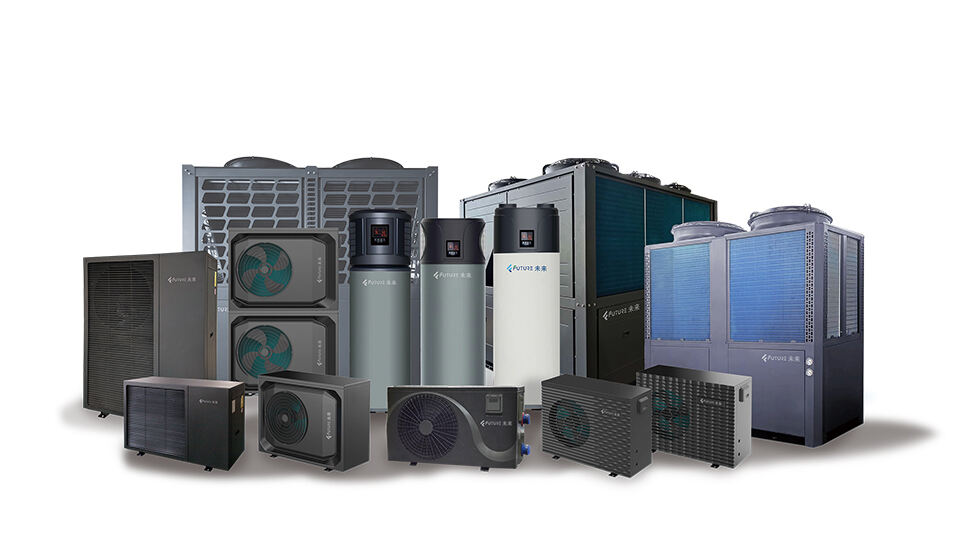Qual è il principio di funzionamento della pompa di calore a sorgente aria?
Come attrezzatura efficiente, risparmiatrice di energia e amica dell'ambiente, Pompa di calore a sorgente aria occupa una posizione importante nel campo dell'utilizzo dell'energia moderna. Il principio di funzionamento della pompa di calore a sorgente aria si basa sul concetto di trasferimento di calore, che utilizza in modo intelligente l'energia termica presente nell'aria per realizzare il trasferimento ed il miglioramento dell'energia, con numerosi vantaggi significativi. Di seguito verranno illustrati il principio di funzionamento e i vantaggi delle pompe di calore a sorgente aria:
Ciclo di lavoro di base
La pompa di calore a sorgente aria è costituita principalmente da quattro componenti principali: evaporatore, compressore, condensatore e valvola di espansione. Il processo di funzionamento della pompa di calore a sorgente aria forma un sistema di ciclo chiuso.
1. Evaporatore - estrazione del calore
L'evaporatore è un componente chiave per lo scambio di calore tra la pompa di calore a sorgente aria e l'aria esterna. Nell'evaporatore, il refrigerante liquido a bassa temperatura e bassa pressione (come il Freon) entra dopo essere stato regolato e decompresso dalla valvola di espansione. A questo punto, il punto di ebollizione del refrigerante si abbassa notevolmente, ed esso si evapora rapidamente all'interno dell'evaporatore. Poiché una grande quantità di calore è necessaria per passare dallo stato liquido a quello gassoso, e la temperatura dell'aria intorno all'evaporatore è relativamente alta, il calore viene trasferito dall'aria al refrigerante, causando l'evaporazione del refrigerante in uno stato gassoso a bassa temperatura e bassa pressione, mentre l'aria viene raffreddata. Questo processo raggiunge lo scopo di assorbire calore dall'aria, proprio come estrarre calore gratuito dal grande "serbatoio di calore" della natura.
2. Compressore - miglioramento dell'energia
Il refrigerante a bassa temperatura e bassa pressione che esce dall'evaporatore viene aspirato dal compressore, e il compressore lo comprime eseguendo lavoro. Sotto la forte compressione del compressore, la pressione e la temperatura del refrigerante aumentano bruscamente diventando un gas ad alta temperatura e alta pressione. In questo momento, l'energia contenuta nel refrigerante è aumentata significativamente. Proprio come pompare acqua da un luogo più basso a uno più alto attraverso una pompa aumenta l'energia potenziale dell'acqua, il compressore fornisce energia al refrigerante in modo che abbia la capacità di rilasciare calore in un ambiente ad alta temperatura.
3. Condensatore - rilascio del calore
Il refrigerante gassoso ad alta temperatura e alta pressione entra successivamente nel condensatore. Il condensatore è generalmente collegato allo spazio interno che richiede riscaldamento (come tubi per il pavimento riscaldante, radiatori, ecc.) o al serbatoio di acqua calda domestica. Poiché la temperatura del refrigerante è superiore a quella dell'ambiente interno o dell'acqua nel serbatoio, il calore viene trasferito dal refrigerante all'ambiente interno o all'acqua, causando l'aumento della temperatura interna o il riscaldamento dell'acqua. Durante questo processo, il refrigerante gassoso si condensa gradualmente e si liquefa dopo aver rilasciato calore, ritornando allo stato liquido e completando il passo chiave del trasporto di calore dall'aria alla stanza o all'acqua.
4. Valvola di espansione - controllo della circolazione
Dopo che il refrigerante liquido esce dal condensatore, passa attraverso la valvola di espansione. La funzione della valvola di espansione è quella di restringere e decomprimere il refrigerante, causando una riduzione della sua pressione e temperatura per ritornare allo stato a bassa temperatura e bassa pressione quando entra nell'evaporatore, preparandosi per il successivo ciclo di assorbimento di calore nell'evaporatore. La valvola di espansione è come una valvola di regolazione del flusso, controllando con precisione il flusso e la pressione del refrigerante per garantire che l'intero sistema di pompa di calore a fonte aria possa funzionare in modo stabile ed efficiente.
Attraverso un tale processo ciclico continuo, la pompa di calore a fonte aria può continuamente assorbire calore dall'aria e aumentarlo a un livello di temperatura superiore per riscaldamento interno, produzione di acqua calda domestica o realizzazione della funzione di raffreddamento in estate (trasferendo il flusso del refrigerante, il calore all'interno della stanza viene trasferito all'aria esterna)

 EN
EN
 AR
AR
 BG
BG
 HR
HR
 CS
CS
 DA
DA
 NL
NL
 FI
FI
 FR
FR
 DE
DE
 EL
EL
 HI
HI
 IT
IT
 JA
JA
 KO
KO
 NO
NO
 PL
PL
 PT
PT
 RO
RO
 RU
RU
 ES
ES
 SV
SV
 ID
ID
 LV
LV
 LT
LT
 SR
SR
 SK
SK
 SL
SL
 UK
UK
 VI
VI
 SQ
SQ
 ET
ET
 HU
HU
 TH
TH
 TR
TR
 MS
MS
 HY
HY
 HA
HA
 LO
LO
 MY
MY

